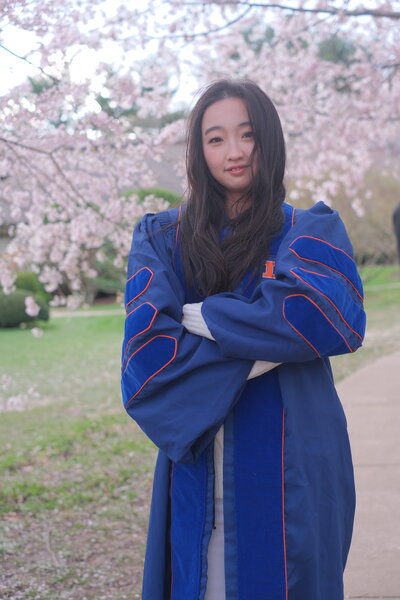
Advisor: Jonathan Sweedler
Future plans? I will be joining AbbVie as a Senior Scientist in Small Molecule Analytical Research and Development.
Talk about your Ph.D. research: My research focuses on developing and applying mass spectrometry-based methods to study peptides and proteins in complex biological systems. These molecules are essential for cell-to-cell communication but are often present at low concentrations, making their analysis challenging. Using liquid chromatography-tandem mass spectrometry (LC-MS/MS), I developed sensitive workflows to quantify them and investigate their roles in disease and physiology. Our key findings include the quantification of trace-level opioid peptides in sickle cell disease models, offering insights into pain mechanisms; the characterization of glycated albumin in tear fluid, which correlates strongly with its level in blood and provides a non-invasive diabetic monitoring strategy; and the proteomic profiling of exercise-induced extracellular vesicles, revealing their role in oxidative stress regulation and vascular protection. Collectively, this work demonstrates how advanced analytical techniques can uncover molecular signatures with diagnostic and therapeutic significance.
What are the applications of your research? Sickle cell disease (SCD) affects over 100,000 individuals in the U.S. and 20 million worldwide. Pain is the most common and debilitating symptom of SCD. Our findings showed elevated hemorphin levels in both plasma and brain tissues of SCD transgenic mice, suggesting these endogenous opioid peptides may play a role in SCD-related pain. By linking hemorphin levels with pain behavior and classical opioid signaling, this work may contribute to the identification of new biomarkers and the mechanisms of SCD-related chronic pain.
In another project working with diabetic samples, we demonstrated that glycated albumin (GA) in tear fluid strongly correlates with GA levels in blood. This finding supports the development of a non-invasive, tear-based method for monitoring glycemic control, potentially improving patient compliance and reducing the need for frequent blood sampling.
Awards: 2025 American Society of Mass Spectrometry Graduate Student Award, Rising Star Award in 2024 Wisconsin Human Proteomics Symposium
Activities outside the lab: I participated in the Beckman Open House 2024, an event where we presented our science to kids and junior high students through hands-on demonstrations and interactive activities. It was a rewarding experience to spark curiosity and excitement about science in a younger audience. I enjoyed the challenge of communicating complex research in an accessible and engaging way, and it reminded me of the broader impact our work can have beyond the lab.
How does it feel to reach this milestone? It is so exciting and unbelievable! It really took me a long time—and a long journey across the Pacific Ocean:)—to get here. There were definitely moments of doubt and exhaustion, but looking back, I’m proud of how much I’ve learned—not just in science, but in resilience, problem-solving, and collaboration.
Major highlight? A highlight of my time as a graduate student at Illinois has been my experience in the Sweedler Research Group. I had the opportunity to work with incredibly talented and driven future scientists, and it was inspiring to grow alongside them. I also had access to advanced instrumentation, the independence to pursue my own projects, and constant support from my PI and research professors.
Any mentors who were especially impactful in your educational journey? I am deeply grateful to Dr. Elena Romanova for her invaluable guidance on instrumentation and projects. She is incredibly kind, approachable, and reliable. I have benefited immensely from her expertise and insightful discussions, which have been instrumental in overcoming technical challenges and refining my experimental approaches.
Advice for other graduate students? Stay self-motivated and always keep your long-term goals in mind. Grad school can be challenging, but try to enjoy life as much as you can along the way. Don’t stress too much over the little things--it’s okay to not have everything figured out.